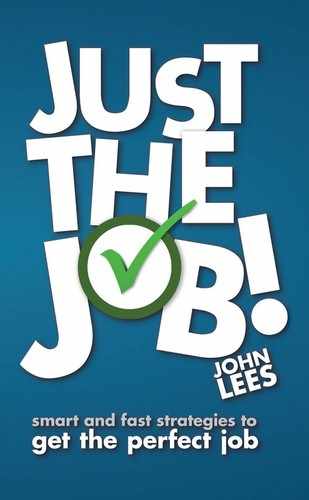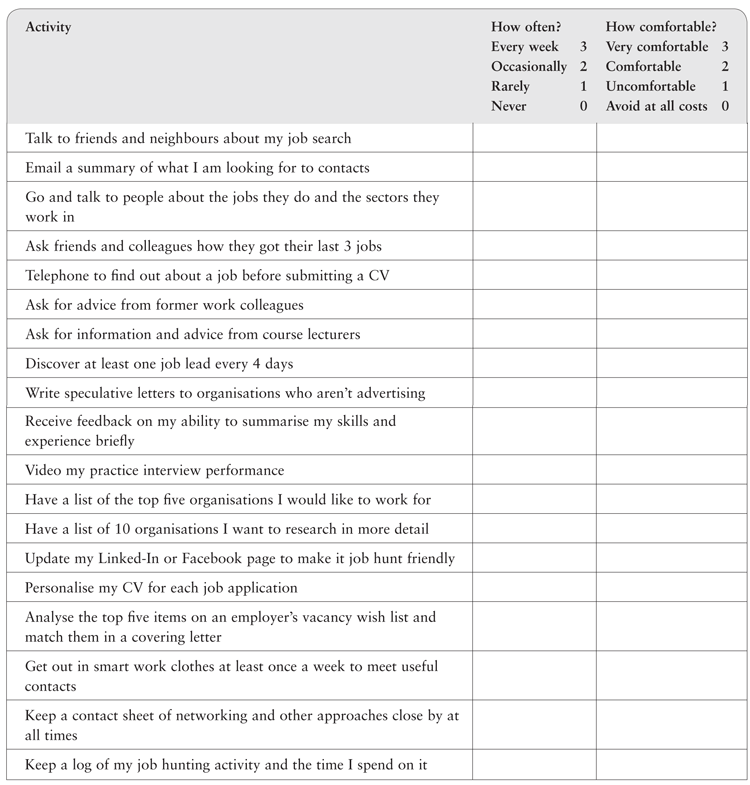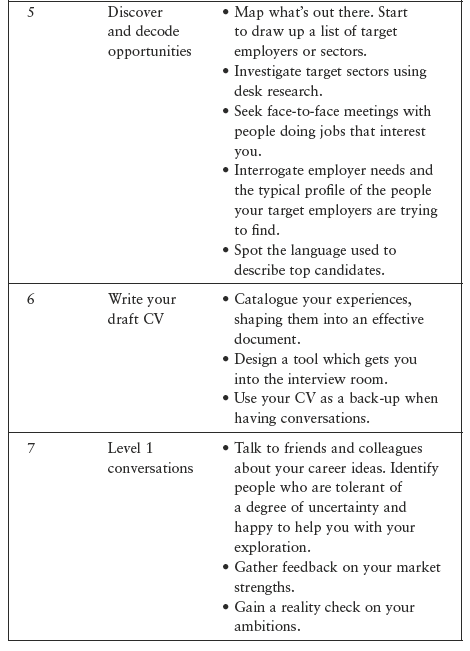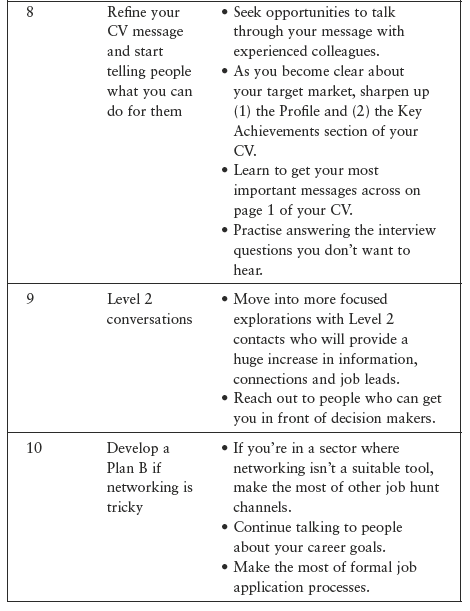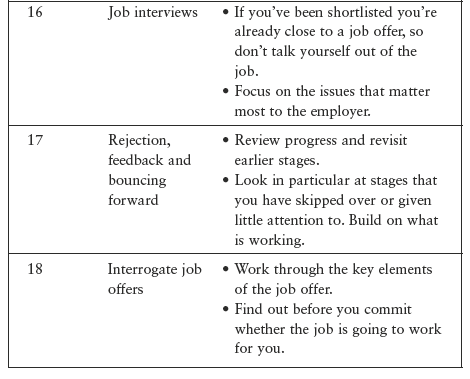Your job hunting plan
THIS CHAPTER LOOKS AT:
- Preparing for job hunting in a tough market
- The things that might pass for planning
- Why planning might help more than you think
- An outline of your job hunting campaign
PLANNING FOR AN UPHILL STRUGGLE?
You don’t need a book to tell you what it’s like looking for a job in a tough market – unemployment levels are rarely out of the news. There are plenty of people competing for jobs, and employers have their pick from a strong field of candidates. Friends and family will almost gleefully tell you about people they know who have been forced to take poorly paid (or unpaid) jobs, or people who have applied for over a thousand jobs without success. We seem to enjoy painting the grimmest possible picture. Every depressing story feels as if it adds more kilos to your rucksack. What seemed like a long but manageable walk on level ground has now become an uphill climb carrying half your body weight. Bad news makes us see difficulty and scarcity rather than glimpses of opportunity.
And yet, interestingly, many people felt exactly the same way about job hunting just a few years back when jobs were abundant. The media still emphasised stories about lay-offs and closures, and even then people felt they had very limited choices. People gave up too soon, limited their options, lowered their sights, when jobs were plentiful. That should tell us all something very important – how you feel about job hunting matters. The mindset you adopt is just as important as planning or activity. It is vital not to under-estimate the difficulties of today’s marketplace. Yet, even in a recession employers still find it hard to recruit the right people, and some of the people who have the right skills fail to get noticed. The market continues to reveal varied and extensive opportunities to the expert job hunter.
You may feel you have time on your hands when job hunting, but your energy is finite. Many put that energy into worrying about how long they will be out of work rather than into a simple and effective job hunting plan.
WHAT MAKES AN ABOVE AVERAGE JOB HUNTING PERFORMANCE?
This book draws extensively on the views of experts who help people find jobs. Career coach Stuart McIntosh is very aware of the dilemma faced by many job seekers today:
They have a tendency to fear the worst (end of the world, they’re on the scrapheap), they do not see their skills as transferable and opt for a ‘better in a job than out of a job’ comfort blanket to justify applying for roles well beneath their current skill and pay level, on the basis that they will keep looking for a better job once they are in a job. The problem is that they get stuck in low paid jobs with poor job satisfaction.
Many people rush to the market in this way, worrying about the impact of unemployment on their work history, not realising that, in Stuart McIntosh’s terms:
Employers will accept periods of unemployment as long as you can demonstrate intelligent job searching, and your ‘sell-by-date’ can extend for up to 12 months without damage to your brand.
What do top job hunters do differently? You might think they have more marketable skills, have fantastic connections and a brilliant CV. You might believe that they are more aggressive, more energised, happier to knock down doors and push themselves forward. Be careful with that kind of thinking – believing ‘I’m not an aggressive job seeker’ is a good way of saying ‘I can go easy on myself if I don’t push as hard as I can’.
Look at the Job Search Preferences table below. Firstly, consider how often you engage in the activities listed. Reflect honestly on the difference between what you do, and what you talk about doing. Next, look at how comfortable you feel about the activities your job hunting campaign will need to include. Your results will show the gaps in your performance and those areas you will find reasons to avoid.
GETTING A PLAN TOGETHER
Everyone has some kind of job hunting plan, even if it’s ‘I’ll buy an evening paper’. Some planning is constructive – a list of people you need to talk to, perhaps, or plans to attend events and conferences where you might meet useful people. Other plans feel more like the words of the Schultz cartoon character Charlie Brown, ‘I’ve developed a new philosophy … I only dread one day at a time’.
Often job hunt plans are over-ambitious. You promise yourself that you will keep busy, that you will chase down every prospective contact, that you will leave no stone unturned. This plan may rely too much on early success, hoping that your perfect job is just around the corner, taking little account of fluctuating energy and confidence levels. While activity levels and numbers of approaches clearly matter, simple over-activity can wear you out with weak results. Other plans mistakenly believe there is some hidden scientific formula about the magic steps that will win you a job. In general, people report that they spend far more time job hunting during a week than they actually do (see Chapter 3).
So, how do we plan well when most people don’t make developed plans, don’t anticipate setbacks, and over-promise and under-deliver in their job hunt? The first stage is to have some kind of structure. Not everyone needs or likes structures, but most of us need structure slightly more than we admit. Having a structured plan means that you can see where you’re making progress and where you’re not. It means you demonstrate the right behaviours at the right stages and take risks in the right points. Planning helps you use your time well and wisely. You ensure that you take on tasks in the right order and at the right pace (see Chapter 3 for a more on timing). Planning means that you can see where you have made progress, and see what else you have to do. A plan means you can see the difference between random responses and proper market feedback. It means you can work smarter, rather than harder, at making connections and finding a job.
COMMITTING TO A WRITTEN PLAN
All planning is about anticipating bear traps rather than walking into them. It is also about staging activity in scheduled projects. Writing things down helps. Many people have experience of writing business plans, but don’t write one for their job search. Career coach and blogger Leon Hendra writes:
I write a business plan with clients, the business being the job hunt and often the next job. This includes business case, objectives, phases of the process, marketing plans / objectives, resources required, and timeframe; it energises the process for them and makes it seem like a more professional endeavour. I encourage my clients to take the plan to interviews – it often ended up becoming the framework of a business plan for their next leadership position.
How are you going to devise a plan? Here’s the good news. This book will do it for you. An overview of Your Job Hunting Plan is set out in diagram form on page xiv near the beginning of this book, and in more detail below. Each stage of the plan corresponds to a chapter in this book.
Your job hunting plan
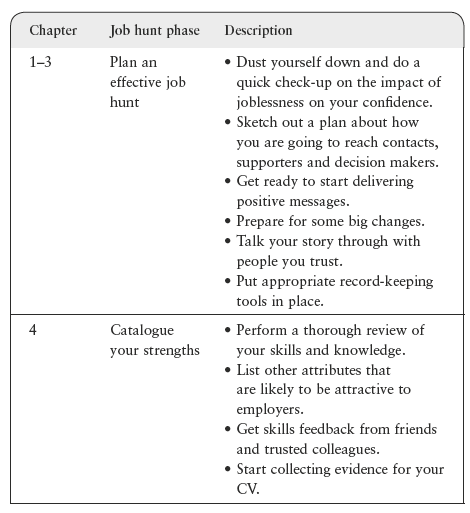
This version of the Job Hunting Plan gives you a road map of where you will be going and what you will be doing. You can of course dip into chapters as you need to, but be careful if you get too far ahead without doing some of the important planning work.
Can you accelerate progress? Yes, by working hard at some of the initial stages. Be careful though – read the section which deals with timing issues, including the dangers of going to the market when your confidence is low and your story isn’t straight yet (Chapter 3).
What if you get an early job interview? Congratulations – you’ve got an early result. Don’t blow it. Look carefully at decoding employer’s needs (Chapter 5), your primary messages (Chapter 8) and interview techniques (Chapter 16). You might also consider getting hold of a copy of The Interview Expert.
